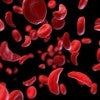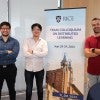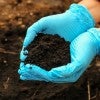
Atomic dance gives rise to a magnet
Rice researchers turned a paramagnetic material into a magnet by manipulating electrons’ spin via atomic motion.

Atomic dance gives rise to a magnet
Rice researchers turned a paramagnetic material into a magnet by manipulating electrons’ spin via atomic motion.

Rice University and its Biotech Launch Pad today announced a peer-reviewed publication in Nature Communications detailing the development of a novel and rechargeable device — an electrocatalytic on-site oxygenator (ecO2) that produces oxygen to keep cells alive inside an implantable “living pharmacy,” potentially improving the outcomes of cell-based therapies.

Annual SSPEED Center conference welcomes international flood-control experts
The Severe Storm Prediction, Education and Evacuation from Disasters (SSPEED) Center at Rice hosted its 11th annual conference last month at the university’s Anderson-Clarke Center.

Rice VP for research addresses energy demand at international engineering conference
Rice Executive Vice President for Research Ramamoorthy Ramesh presented the Robert Henry Thurston Lecture, “Energy: The True Final Frontier,” at the International Mechanical Engineering Congress and Exposition.

Global temperature variations impact the planet’s water cycle
A new study by Rice climate scientist Sylvia Dee and an international team of collaborators sheds light on the impact that global temperature variation over the past 2,000 years has had on the planet’s hydrological cycle.

Rice expert available to comment on FDA decision on sickle cell disease therapy
Rice University’s Gang Bao is available to comment on today’s decision by the FDA on whether or not to approve a CRISPR-based therapy for sickle cell disease.

A Rice-led collaboration of engineers, oncologists and global health partners from three continents is establishing a research center in the Texas Medical Center to develop affordable, effective point-of-care (POC) technologies to improve early cancer detection in low-resource settings in the United States and other countries.

Breakthrough synthesis method improves solar cell stability
A process developed by Rice engineers and collaborators yields 2D halide perovskite crystal layers of ideal thickness and purity through dynamic control of the crystallization process ⎯ a key step toward ensuring device stability for optoelectronics and photovoltaics.

Rice’s Naomi Halas wins Mildred Dresselhaus Prize
Naomi Halas, a pioneering researcher in the fields of nanophotonics and plasmonics at Rice University, has been awarded the 2024 Mildred Dresselhaus Prize for Nanoscience/Nanomaterials from the American Physical Society.

Rice’s Gustavo Scuseria wins Aneesur Rahman Prize
Pioneering computational chemist Gustavo Scuseria has won the 2024 Aneesur Rahman Prize for Computational Physics.

Rice hosts distributed computing, machine learning colloquium
Rice hosted the Texas Colloquium on Distributed Learning, a two-day summit of talks on distributed computing and large-scale machine learning held at the new Ralph S. O’Connor Building for Engineering and Science.

Three from Rice elected fellows of the American Physical Society
Rice University faculty members Sibani Lisa Biswal , Kaden Hazzard and Andriy Nevidomskyy have been elected fellows of the American Physical Society.

Rice helping study how soil health improvement can boost crops
America’s farmers rely on a host of practices such as cover cropping and crop rotation to maintain soil health, grow more productive crops and feed the U.S. and countries around the world. However, current research is too sparse to precisely demonstrate how these practices can actually affect the yields and bottom line for farmers.

Decontamination method zaps pollutants from soil
A rapid, high-heat electrothermal soil remediation process developed by Rice scientists and collaborators at the United States Army Engineer Research and Development Center flushes out both organic pollutants and heavy metals in seconds without damaging soil fertility.

Rice University welcomes US Navy research official on campus visit
Rice University welcomed Brett Seidle, deputy assistant secretary of the Navy for research, development, test and engineering, on a campus visit Oct.13.